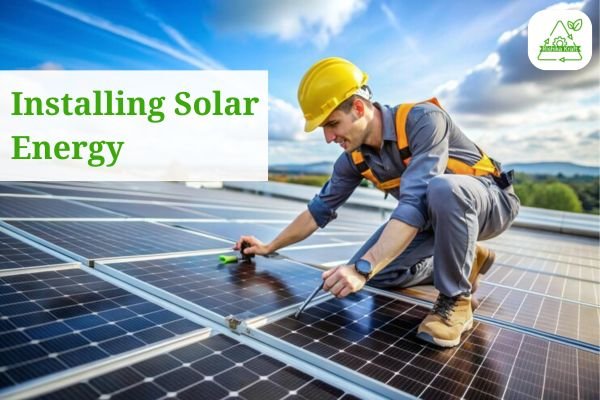Solar energy has become a popular topic of discussion in recent years. The sun provides us with a tremendous amount of power, enough to meet the world’s energy needs for an entire year in just one day. Utilizing solar energy can have a profound impact on our planet. When sunlight is converted into heat and electricity, it can power homes, businesses, and even electric vehicles. But is solar energy genuinely worth it? Let’s read the benefits and drawbacks to help you decide.
The Benefits of Solar Energy
1. Renewable Energy Source
Solar energy is a renewable and limitless source of power. It’s available every day and doesn’t produce harmful emissions like traditional energy sources. As long as the sun shines, we’ll have access to this clean energy for billions of years. Solar energy also doesn’t require water, making it a more sustainable option compared to conventional power plants.
2. Reduces Electricity Bills
One of the most appealing benefits of solar energy is that it reduces electricity bills significantly. By generating your power, you become less dependent on the grid, lowering your monthly energy costs. Larger solar systems can meet most of your energy needs, and excess electricity can be sold back to the utility company, further increasing your savings.
3. Earn Money Through SRECs
In certain regions, homeowners can earn money through Solar Renewable Energy Certificates (SRECs). These are performance-based incentives that reward you for the energy your solar system produces. For every megawatt-hour of electricity your system generates, you earn one SREC. You can then sell these certificates, providing an additional income stream from your solar investment.
4. Low Maintenance Costs
Solar energy systems require minimal maintenance, as they have no moving parts that could wear out. Occasional cleaning is usually all that’s needed, and you can hire professionals to do this for a small fee. With a lifespan of around 25 years, solar panels are a cost-effective, long-term investment that can pay for themselves over time.
5. Increases Home Value
Installing solar panels can increase the value of your home. Many buyers are attracted to the idea of reduced electricity bills and a sustainable energy source, which can make your residential property more appealing in the real estate market. Studies have shown that homes with solar energy systems can sell for up to ₹12,60,000 more than those without.
6. Other Benefits
- Independence from the Grid: Solar energy allows you to be less dependent on the grid, giving you more control over your power supply.
- Climate Versatility: Solar panels can be effective in various climates, not just sunny ones.
- Cost Savings: Over time, the savings on electricity bills can add up, making solar energy an intelligent financial decision.
The Drawbacks of Solar Energy
1. High Initial Costs
The initial cost of installing solar panels can be high, covering expenses like the panels, inverters, batteries, and installation. While prices are expected to drop as technology advances, the upfront investment can still be a barrier for many. Leasing options are available to help reduce these costs, but solar panels are generally more suitable for homeowners who plan to stay in their homes long enough to see a return on their investment.
2. Expensive Energy Storage
Storing solar energy can be costly, especially with newer battery technologies. While lithium-ion batteries have made solar storage more reliable and affordable, the initial expense is still significant. These batteries store energy collected during the day for use at night, ensuring a continuous power supply. However, due to the high costs, some homeowners choose to use solar energy during the day and rely on the grid at night.
3. Not Suitable for Every Roof
Solar panels aren’t a one-size-fits-all solution. The effectiveness of solar energy depends on your roof’s orientation and material. If your roof doesn’t face the sun or isn’t angled correctly, it won’t capture enough sunlight. Roof materials like asphalt shingles, metal, or tiles are ideal for solar panels, while others can make installation more challenging and expensive.
4. Weather Dependency
Solar energy production is directly related to sunlight, which means cloudy or rainy days can reduce efficiency. While solar panels still generate some energy in these conditions, they cannot produce power at night. To address this, you’ll need to invest in batteries to store extra energy for future use. However, this adds to the cost and maintenance of the system. Some people opt to combine solar with wind power to ensure a more consistent energy supply.
5. Need of Space
Solar panels require a vast amount of space, and not all roofs are suitable for installation. If your roof is too small or not positioned correctly, you may not be able to install enough panels according to your energy needs. In such cases, consider installing panels in your yard, provided you have enough space and the right conditions.
6. Environmental Impact
While solar energy is much cleaner than fossil fuels, its production and installation are not entirely free of environmental impact. Manufacturing solar panels involves the use of hazardous materials and can produce pollutants. Additionally, the disposal of old panels must be handled carefully to avoid environmental harm. Despite these concerns, solar energy remains a far greener option compared to most traditional energy sources.
Conclusion
Solar energy offers numerous benefits, from reducing electricity bills to providing a renewable, clean source of power. However, it also comes with some drawbacks, such as high initial costs and dependency on weather conditions. As the technology continues to evolve, many of these challenges are expected to diminish, making solar energy an increasingly viable option for more households. Whether or not solar energy is the right choice for you depends on your circumstances, but its potential to benefit both the environment and your wallet is undeniable. If you are thinking of installing solar panels at your home, then Rishika Kraft in Gurgaon is the best place to install them.


